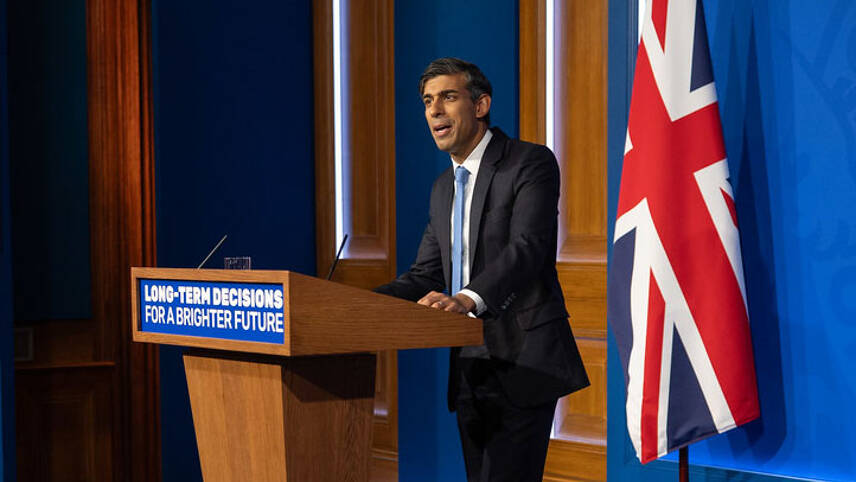Register for free and continue reading
Join our growing army of changemakers and get unlimited access to our premium content

Image: 10 Downing Street. CC BY-NC-ND 2.0 DEED. https://www.flickr.com/photos/number10gov/53201384529/
That is according to the Government’s advisory body the Climate Change Committee (CCC).
The Committee has today (12 October) revealed that the Government has not provided its staff with any estimates of the likely future emissions impact of policy alterations confirmed by Sunak on 20 September. These included a five-year delay on the ban of new petrol and diesel cars and vans, to 2035; a weakening of requirements for all homes with oil and gas boilers to replace them with low-carbon alternatives and weakened requirements for landlords to improve building energy efficiency.
Sunak stated that these changes would not undermine the UK’s long-term transition to net-zero and argued that they were compatible with promised emissions trajectories. The CCC has not seen any numerical evidence of this to date, it announced today in a blog post.
Based on the information that is available, the CCC is foreseeing only a small change in the UK’s likely emissions trajectory in the near-term and medium-term as a result of changes made in road transport. This is largely due to the Government following Sunak’s initial announcement with a clear, updated Zero-Emission Vehicle (ZEV) mandate, setting annual targets for auto manufacturers to increase the share of sales accounted for by zero-emission options.
However, the CCC believes the changes made regarding home heating and building energy efficiency will carry more risk in terms of their ability to undermine the delivery of the UK’s legally binding carbon budgets and 2050 net-zero target.
The CCC’s blog post states: “While a 2035 phase-out date for fossil boilers is potentially compatible with net-zero, the exemption of 20% of households from the phase-out will have an impact on emissions all the way out to 2050 making net-zero considerably harder to achieve.
“Furthermore, unless there is a clear definition of which 20% of households are exempt, it may lead to a lack of clarity for a wider share of the buildings sector.
“Most importantly, it creates widespread uncertainty for consumers and supply chains.”
Sunak said he made the changes to avoid burdening households with the high upfront costs of a heat pump. As such, he also increased the maximum amount each home can claim under the Boiler Upgrade Scheme from £5,000 to £7,500.
The CCC said that because this change has not been accompanied by a larger budget, fewer homes will be provided with support. The Committee also warned that “technology cost reductions often stem from policy certainty, which these announcements undermined”. In other words, heat pump prices could stay higher for longer as a result of Government U-turns.
Sending the wrong message
All in all, the CCC said it is no less concerned about the UK’s likelihood of reaching net-zero by 2050 than it was when it published its most recent annual progress report to Parliament earlier this year.
The Committee’s updated conclusion is that around 20% of the emissions reductions required through to 2030 are not backed up with sufficient, credible policy plans. Heating and buildings present key policy gaps, as does agriculture.
And, while the UK has made strong progress to date in decarbonising its power sector, the CCC is warning that future success will be dependent on fixing the mistakes made at the most recent Contracts for Difference (CfD) auction round. The round attracted no offshore wind project bids, despite this being the Conservative Party’s preferred source of renewable energy. The Committee attributes this to a failure to adjust the strike price to reflect significant increases in supply chain costs.
The CCC’s blog states: “In forthcoming auction rounds, it is imperative that policy is adjusted to deliver contract awards and the commissioning of offshore wind farms as soon as possible, given the essential contribution of offshore wind to net-zero and the very high costs of gas-fired generation used in the meantime.”
The blog goes on to discuss how the Prime Minister’s messaging on net-zero is likely to have “broader implications” both domestically and globally.
In the UK, the blog warns, Sunak’s choice to frame climate action as too expensive could undermine consumer trust in low-carbon technologies and services despite the persistently high price of gas, petrol and diesel. A lack of long-term clarity could also undermine investment in British supply chains for fast-growing sectors.
On a global stage, the annual progress report from the CCC concluded that the UK had lost a previously “clear” international leadership position on climate.
CCC Chair Professor Piers Foster said there has subsequently been “renewed scrutiny” from other nations following Sunak’s speech.
Foster said: “We urge the Government to restate strong British leadership on climate change in the crucial period before the next climate summit, COP28 in Dubai.”


Please login or Register to leave a comment.